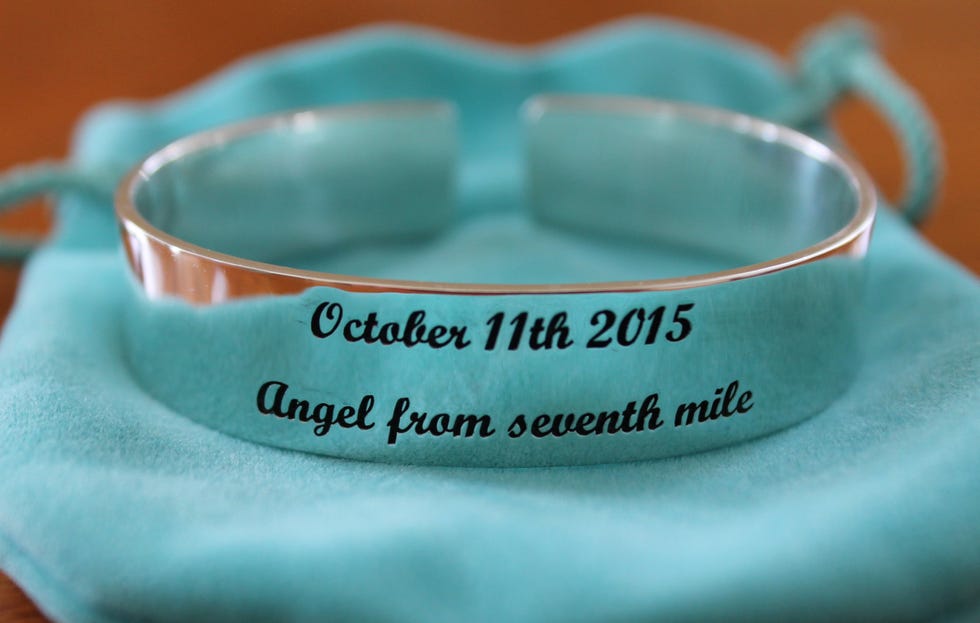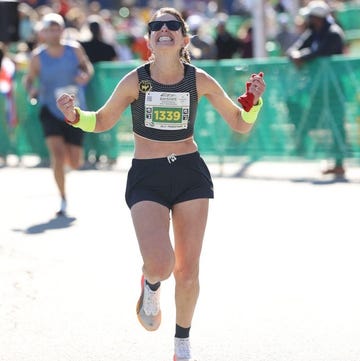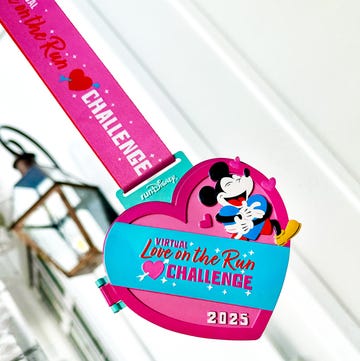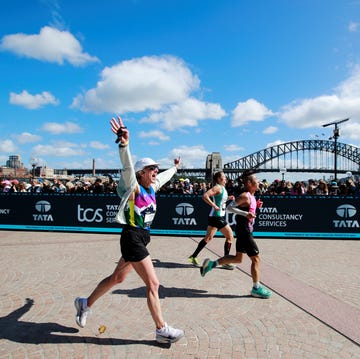The first of Richard Sikorski’s photos from last year’s Chicago Marathon could have come from any of the 14 times he’s started the race. He stands, bleary-eyed, in his suburban Bolingbrook living room on race morning. Then at mile 5, a race photographer captures his sunglasses, smile, and blue fanny pack.
About two miles later, Sikorski told Runner’s World, his legs started to feel weak, his lungs thirsty for air. He doesn’t remember what happened next. But a third photo, snapped by a passerby, shows a crowd of runners around a man lying flat on his back.
Shortly after mile 7, Sikorski, then 66, collapsed and lost consciousness. A sudden cardiac arrest caused his heart to stop beating. But thanks to two fellow runners who performed CPR, he was revived.
Now, after recovering from quintuple bypass surgery, he’s running the race again—with one of the women who saved his life.
“Stay With Us”
Those women—both medical professionals—don’t need the photo to remind them of what transpired.
Nurse practitioner Deanna Rechtzigel, 43, had come from Las Vegas to run her first marathon. The event was already full of meaning. She’d lost her dad to brain cancer 10 years prior, and she raised money for the American Brain Tumor Association while she trained.
RELATED: Virtual Races With the Best Bling
Rechtzigel was admiring Chicago’s scenery when she saw Sikorski crash to the ground about 100 yards ahead of her. She sprinted up, knelt down, and checked for a pulse. He had none.
Immediately, she shifted into medical mode and began performing chest compressions. As she pushed, she yelled. “Stay with us, stay with us,” she told him.
Angie Bernotus, a 34-year-old registered nurse from Valparaiso, Indiana, was also running her first marathon. She didn’t see Sikorski fall but spotted a commotion around him.
When she reached the crowd and saw that another runner was performing compressions, she began mouth-to-mouth resuscitation.
Sudden cardiac arrest strikes one in every 150,000 to 200,000 runners during a marathon, according to Chicago Marathon medical director George Chiampas, D.O. Because the Chicago Marathon has 45,000 runners, odds are that one may occur every two to three years.
About 150 automatic external defibrillators, which can shock the heart back into action, line the course at aid stations and in spotter towers and ambulances. In fact, race participants are far more likely to survive sudden cardiac arrest than those who experience it in other places.
But when the heart stops, every second counts. CPR can keep blood and oxygen flowing to the brain and other organs until help arrives. “That bridges that chance of survival, which is huge,” Chiampas said.
A Swift Return
Neither Rechtzigel nor Bernotus can say how long they were stopped. After paramedics took over, they remembered what they were there to do—and resumed running. “Apparently mile 8 was my best split,” Rechtzigel said. She finished in 5:36; Bernotus in 5:41.
The paramedics used a defibrillator and got Sikorski’s heart beating again. They took him to a nearby hospital. Tests revealed blocked arteries, which run in his family. Though sudden cardiac arrest is different from a heart attack—the usual consequence of clogged blood vessels—one can trigger the other.
Later that week, he had quintuple bypass surgery. Almost immediately, he began asking doctors when he could run again. In cardiac rehab, nurses had to stop him from kicking up the speed on the treadmill. “I want to do what I love to do,” he said.
Sikorski’s cardiologist—a marathon runner who’s also racing Sunday—eventually gave him the all-clear to train for this year’s race. He just has to run slowly and stop if he needs to, and come in for a check-up afterward.
“My daughter said it like this: ‘Dad, the doctors told you your engine, your heart, is OK. You had some problems with your tires. Now you’ve got five new tires—even a spare,’” he said.
A Half to Full Marathon Training Plan
Meanwhile, Anna Sikorski set out on a mission to find the women who saved her father. She posted a note and the mile 7 photo on Facebook. Eventually, she found Bernotus and Rechtzigel, who were relieved to learn Sikorski had survived.
The two kept in touch with the family but hadn’t met again—until last week. At a dinner, Sikorski presented Bernotus with a gift: a bracelet (below) inscribed with last year’s race date and the words “Angel from seventh mile.”
“The last time I saw him, he was dead,” Bernotus said. “Words can’t really describe that feeling.”
Bernotus won’t run this year because of a back injury. But she’ll cheer Sikorski on from the finish line.
From the beginning, Rechtzigel told Sikorski that if he recovered, she’d run the race with him. The two plan to reunite after she arrives in Chicago Friday afternoon and then again Sunday at the starting line.
“He needs to finish what he started, and this is his journey,” Rechtzigel said. “I’m just thankful I get to be invited.”
This year, Sikorski doesn’t have a target time, though eventually, with his cardiologist’s permission, he’d like to train harder and try to qualify for Boston. But that doesn’t mean he lacks a short-term goal.
“I am missing a picture from the finish line,” he said. “After Sunday, we will have it.”

Cindy is a freelance health and fitness writer, author, and podcaster who’s contributed regularly to Runner’s World since 2013. She’s the coauthor of both Breakthrough Women’s Running: Dream Big and Train Smart and Rebound: Train Your Mind to Bounce Back Stronger from Sports Injuries, a book about the psychology of sports injury from Bloomsbury Sport. Cindy specializes in covering injury prevention and recovery, everyday athletes accomplishing extraordinary things, and the active community in her beloved Chicago, where winter forges deep bonds between those brave enough to train through it.














